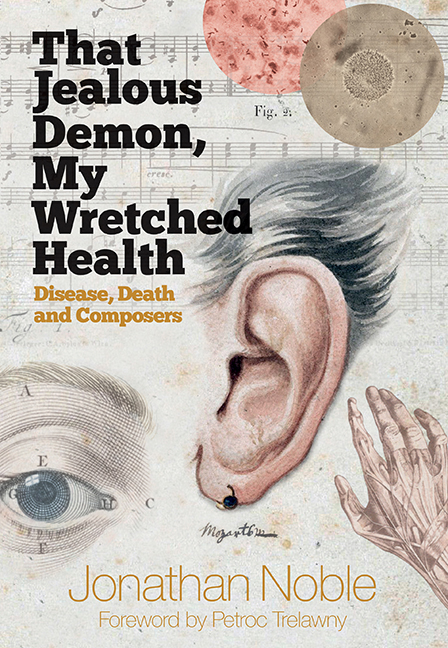Book contents
- Frontmatter
- Dedication
- Contents
- List of Illustrations
- Foreword
- Acknowledgements
- Medical Glossary
- Introduction
- 1 The Frailty of Youth
- 2 A Triumphant Old Age
- 3 Iatrogenic Afflictions
- 4 Syphilis
- 5 Alcoholism
- 6 Troubled Minds: Mental Illness and Suicide
- 7 Nerves Beyond the Edge: Other Afflictions of the Nervous System
- 8 Broken Hearts
- 9 Breathless: Respiratory Diseases
- 10 Cancer
- 11 The Ultimate Blow: Deafness
- Epilogue and Coda
- Appendix: Accidental and/or Violent Deaths
- References
- Bibliography
- Index
7 - Nerves Beyond the Edge: Other Afflictions of the Nervous System
Published online by Cambridge University Press: 05 September 2018
- Frontmatter
- Dedication
- Contents
- List of Illustrations
- Foreword
- Acknowledgements
- Medical Glossary
- Introduction
- 1 The Frailty of Youth
- 2 A Triumphant Old Age
- 3 Iatrogenic Afflictions
- 4 Syphilis
- 5 Alcoholism
- 6 Troubled Minds: Mental Illness and Suicide
- 7 Nerves Beyond the Edge: Other Afflictions of the Nervous System
- 8 Broken Hearts
- 9 Breathless: Respiratory Diseases
- 10 Cancer
- 11 The Ultimate Blow: Deafness
- Epilogue and Coda
- Appendix: Accidental and/or Violent Deaths
- References
- Bibliography
- Index
Summary
It is in the brain, and the brain only, that the great sins of the world take place
Oscar Wilde, The Picture of Dorian Gray, 1891Introduction: The Nervous System
In our epoch of rapidly evolving medical science we can look forward to a time quite soon when cancer and heart disease might often be little more than interruptions to our lifestyles and not threats to life itself. So much more of the human system has become accessible, reparable and controllable. A major exception is the nervous system, with its difficulties of surgical access but, above all else, an inability to repair itself or to be repaired, which makes diseases such as motor neurone disease, multiple sclerosis and the aftermath of head injury or stroke still so devastating. There are now some encouraging signs of progress born of genetic engineering and microchip technology.
The nervous system is enormously complex. There are many millions of nerve cells (neurones), some highly specialised, in our brains, and they are all interconnected. Of prime importance is the central nervous system, which consists of the brain, the repository of our higher functions (e.g. sight, hearing, speech, emotion, memory, intellect and voluntary movement), and the spinal cord. The latter is the main electrical pathway to and from the brain. The knowledge that our foot is too hot is carried in the sensory nerves to the brain via the spinal cord, and the impulse to quickly move it away from the heat source returns down the spinal cord, passing messages to motor nerves via the peripheral nervous system. When these systems are disturbed, diseased or destroyed, then human life can become truly awful.
We have already encountered neurological disease in earlier chapters. George Gershwin died rapidly from a malignant brain tumour (Chapter 3). Maurice Ravel's brain prematurely atrophied as he developed pre-senile dementia (Chapter 3). A whole chapter is devoted to the dreadful effects of syphilis (Chapter 4), with some of which it was the brain itself which functionally disintegrated, as was the case with Donizetti, or with Smetana, whose auditory nerves were also affected, hence his deafness. It was Delius's optic nerves which were affected, along with the spinal cord.
- Type
- Chapter
- Information
- That Jealous Demon, My Wretched HealthDisease, Death and Composers, pp. 187 - 218Publisher: Boydell & BrewerPrint publication year: 2018



